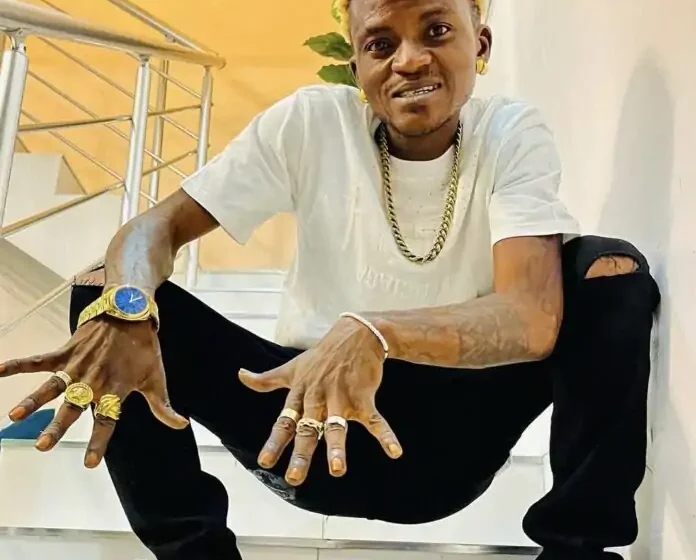Speed Darlington, Portable, other Nigerian celebs declared wanted

The recent declaration of controversial entertainer Speed Darlington as wanted by the National Agency for the Prohibition of Trafficking in Persons (NAPTIP) has once again brought to light a troubling trend — Nigerian celebrities on the wrong side of the law.
While fame often brings glamour, it also magnifies public missteps. In recent years, a number of entertainers have drawn the attention of law enforcement agencies, culminating in public manhunts, court cases, and arrests.
Here’s a look at some notable cases.
1. Speed Darlington – Wanted Over Alleged Rape, Cyberbullying
On June 27, 2025, Speed Darlington (real name: Darlington Okoye) was declared wanted by NAPTIP following a viral video where he claimed to have had sexual relations with a 15-year-old girl. Despite insisting the video was a “clout-chasing joke,” authorities took his confession seriously, especially given the severity of statutory rape laws.
He also ignored multiple summons by NAPTIP, prompting the agency to escalate the matter by involving immigration and security services. If found guilty, he could face life imprisonment.
2. Portable – Wanted by Ogun State Police for Assault
In March 2023, controversial street-hop singer Habeeb Okikiola, popularly known as Portable, was declared wanted by the Ogun State Police Command for allegedly assaulting one of his aides. A viral video captured him instructing a group of men to physically attack the individual.
This came after multiple run-ins with law enforcement over issues ranging from public disturbances to resisting arrest. He was later arrested and granted bail, but not without public drama and online commentary that further fuelled his notoriety.
3. Seun Kuti – Arrested After Assaulting Police Officer
In May 2023, Grammy-nominated Afrobeat star Seun Kuti was caught on video slapping a police officer on the Third Mainland Bridge in Lagos. Although he was not declared wanted, the incident prompted the Inspector-General of Police to order his immediate arrest.
Kuti later turned himself in and was detained by the Nigeria Police Force, sparking intense debate about police-civilian relations and celebrity behaviour. He was released on bail pending trial.
READ ALSO
Speed Darlington declared wanted, reason, other details you should know
4. Naira Marley – Interpol, EFCC, and the Internet Fraud Case
Back in 2019, street-pop artist Naira Marley (Azeez Fashola) was arrested and investigated by the EFCC on allegations of cybercrime and internet fraud. Though not publicly declared wanted, the high-profile nature of his case — including leaked court documents and controversial social media posts — drew national attention.
He was later granted bail but remains under scrutiny, especially after being linked (though never charged) to the death of former signee Mohbad in 2023, a case that reignited calls for his arrest by the public.
5. Burna Boy’s Security Aides – Declared Wanted Over Club Shooting
In June 2022, aides of Grammy-winner Burna Boy were declared wanted by the Lagos State Police Command after a shooting incident at Club Cubana in Victoria Island. The security men allegedly opened fire on patrons after a woman refused Burna Boy’s advances.
Though Burna Boy denied involvement, and was not declared wanted, the incident cast a shadow over his public image. The suspects eventually turned themselves in.
Why It Matters: Fame, Impunity & the Law
These cases highlight a growing friction between celebrity culture and accountability in Nigeria. The country’s increasing reliance on social media for communication and branding has also meant public missteps are now instantly magnified, often with legal consequences.
From resisting arrest to bragging about illegal activities online, many entertainers have blurred the lines between performance and criminality. Law enforcement, under pressure from public outcry and digital evidence, is now responding with more decisive action — as seen with NAPTIP’s declaration on Speed Darlington.
The Bigger Picture
As more celebrities become symbols of youth culture and influence, their actions carry far-reaching implications. The challenge remains ensuring that celebrity status does not shield individuals from the consequences of their actions—while also protecting civil liberties and due process.
Whether it’s Portable in handcuffs, Seun Kuti in court, or Speed Darlington dodging summons, these cases reveal a new phase in Nigeria’s legal and cultural discourse: even the most viral names can be held accountable.

